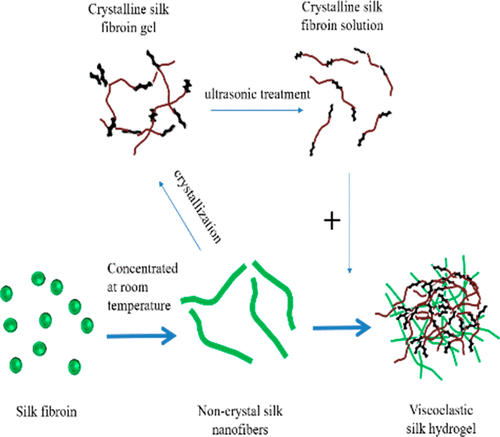当前位置:
X-MOL 学术
›
ACS Biomater. Sci. Eng.
›
论文详情
Our official English website, www.x-mol.net, welcomes your
feedback! (Note: you will need to create a separate account there.)
Viscoelastic Silk Fibroin Hydrogels with Tunable Strength
ACS Biomaterials Science & Engineering ( IF 5.4 ) Pub Date : 2021-01-04 , DOI: 10.1021/acsbiomaterials.0c01348 Danyu Yao 1 , Meiqi Li 1 , Ting Wang 1 , Fangfang Sun 1 , Chang Su 2 , Tingchun Shi 1
ACS Biomaterials Science & Engineering ( IF 5.4 ) Pub Date : 2021-01-04 , DOI: 10.1021/acsbiomaterials.0c01348 Danyu Yao 1 , Meiqi Li 1 , Ting Wang 1 , Fangfang Sun 1 , Chang Su 2 , Tingchun Shi 1
Affiliation

|
Hydrogels are often used as synthetic extracellular matrices (ECMs) for biomedical applications. Natural ECMs are viscoelastic and exhibit partial stress relaxation. However, commonly used hydrogels are typically elastic. Hydrogels developed from ECM-based proteins are viscoelastic, but they often have weak mechanical properties. Here, biocompatible viscoelastic hydrogels with excellent mechanical performance are fabricated by an all aqueous process at body or room temperature. These hydrogels offer obvious stress relaxation and tunable mechanical properties and gelation kinetics. Their compressive modulus can be controlled between 2 kPa and 1.2 MPa, covering a significant portion of the properties of native tissues. Investigation of the gelation mechanism revealed that silk fibroin gelation is caused by the synergistic effects of hydrophobic interaction and hydrogen bonding between silk fibroin molecules. Newly formed crystals serve as the cross-link sites and form a network endowing the hydrogel with stable structure, and the flexible noncrystalline silk nanofibers connect disparate silk fibroin crystals, endowing hydrogels with viscoelastic properties. The all aqueous gelation process avoids complex chemical and physical treatments and is beneficial for encapsulating cells or biomolecules. Encapsulation of chondrocytes results in high initial survival rate (95% ± 1%). These silk fibroin-based viscoelastic hydrogels, combined with superior biocompatible and tunable mechanical properties, represent an exciting option for tissue engineering and regenerative medicine.
中文翻译:

具有可调强度的粘弹性丝素蛋白水凝胶
水凝胶通常用作生物医学应用的合成细胞外基质(ECM)。天然ECM是粘弹性的,并表现出部分应力松弛。然而,常用的水凝胶通常是弹性的。由基于ECM的蛋白质开发的水凝胶具有粘弹性,但通常具有较弱的机械性能。在此,通过在身体或室温下的全水性工艺来制备具有优异机械性能的生物相容性粘弹性水凝胶。这些水凝胶提供明显的应力松弛,可调节的机械性能和胶凝动力学。它们的压缩模量可以控制在2 kPa和1.2 MPa之间,覆盖了天然组织的大部分特性。对胶凝机理的研究表明,丝素蛋白胶凝是由丝素蛋白分子之间的疏水相互作用和氢键的协同作用引起的。新形成的晶体充当交联位点,并形成赋予水凝胶结构稳定的网络,而柔性的非晶态丝纳米纤维连接不同的丝素蛋白晶体,赋予水凝胶具有粘弹性。全水凝胶化过程避免了复杂的化学和物理处理,并且对于封装细胞或生物分子是有益的。软骨细胞的包囊导致较高的初始存活率(95%±1%)。这些基于丝素蛋白的粘弹性水凝胶结合了出色的生物相容性和可调的机械性能,
更新日期:2021-02-08
中文翻译:

具有可调强度的粘弹性丝素蛋白水凝胶
水凝胶通常用作生物医学应用的合成细胞外基质(ECM)。天然ECM是粘弹性的,并表现出部分应力松弛。然而,常用的水凝胶通常是弹性的。由基于ECM的蛋白质开发的水凝胶具有粘弹性,但通常具有较弱的机械性能。在此,通过在身体或室温下的全水性工艺来制备具有优异机械性能的生物相容性粘弹性水凝胶。这些水凝胶提供明显的应力松弛,可调节的机械性能和胶凝动力学。它们的压缩模量可以控制在2 kPa和1.2 MPa之间,覆盖了天然组织的大部分特性。对胶凝机理的研究表明,丝素蛋白胶凝是由丝素蛋白分子之间的疏水相互作用和氢键的协同作用引起的。新形成的晶体充当交联位点,并形成赋予水凝胶结构稳定的网络,而柔性的非晶态丝纳米纤维连接不同的丝素蛋白晶体,赋予水凝胶具有粘弹性。全水凝胶化过程避免了复杂的化学和物理处理,并且对于封装细胞或生物分子是有益的。软骨细胞的包囊导致较高的初始存活率(95%±1%)。这些基于丝素蛋白的粘弹性水凝胶结合了出色的生物相容性和可调的机械性能,











































 京公网安备 11010802027423号
京公网安备 11010802027423号